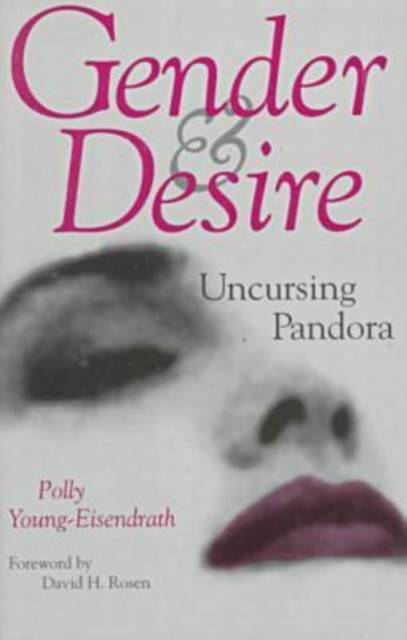
En raison d'une grêve chez bpost, votre commande pourrait être retardée. Vous avez besoin d’un livre rapidement ? Nos magasins vous accueillent à bras ouverts !
- Retrait gratuit dans votre magasin Club
- 7.000.000 titres dans notre catalogue
- Payer en toute sécurité
- Toujours un magasin près de chez vous
En raison de la grêve chez bpost, votre commande pourrait être retardée. Vous avez besoin d’un livre rapidement ? Nos magasins vous accueillent à bras ouverts !
- Retrait gratuit dans votre magasin Club
- 7.000.0000 titres dans notre catalogue
- Payer en toute sécurité
- Toujours un magasin près de chez vous
Description
Also available in an open-access, full-text edition at http: //oaktrust.library.tamu.edu/handle/1969.1/146844 Contradictory and provocative pathways crisscross the terrain of gender among contemporary psychologists and psychoanalysts. Clearing a path through this terrain, Polly Young-Eisendrath describes and illustrates issues of gender and desire among women and men.
Young-Eisendrath introduces three world views: premodern, modern, and postmodern. Then, she calls our attention to how we shape reality and clearly explains how a lived postmodern philosophy is essential for us to understand ourselves and how we can change.
Next, she discusses gender and sex differences in terms of how the former are flexible and the latter are not. The division of the human community into the two exclusive groups of male and female has important psychological implications on both conscious and unconscious levels. Most depth psychological theories of gender and sex have been androcentric, taking males as the norm for health, and have failed to develop a full understanding of desire, opposition, and idealization between the sexes.
One major theme in a depth psychology of gender is that of Woman as the object of desire. The Greek myth of Pandora deftly illustrates the problem of female beauty: as the "desire-awakening maiden" Pandora is powerful but empty. The link between female beauty, power, and evil teaches us about the consequences of female appearance as a commodity to be used among men. Zeus placed the curse of Pandora on humankind, as a punishment for the theft of fire from the gods, and we are still living with the effects of this patriarchal curse. The double bind of female beauty (damned if you engage it and damned if you don't) must be lifted from the male-female relationships in this time of growing equality and reciprocity between the sexes.
For women and men to reach their full potential of development as individuals and in relationships, they must break Pandora's curse and free themselves from the myth of the power of female beauty.
In working to liberate us from the curse of Pandora, Young-Eisendrath has developed a theory of desire: desire contains within it a primordial absence, a sense that something is missing. When we come to understand the nature of desire itself we can be liberated from it domination.
Drawing on experiences from culture, everyday life, and psychotherapy, Polly Young-Eisendrath's Gender and Desire: Uncursing Pandora provides a full engagement with the intricacies and complexities of gender, desire, and liberation for women and men in a postmodern world.
Young-Eisendrath introduces three world views: premodern, modern, and postmodern. Then, she calls our attention to how we shape reality and clearly explains how a lived postmodern philosophy is essential for us to understand ourselves and how we can change.
Next, she discusses gender and sex differences in terms of how the former are flexible and the latter are not. The division of the human community into the two exclusive groups of male and female has important psychological implications on both conscious and unconscious levels. Most depth psychological theories of gender and sex have been androcentric, taking males as the norm for health, and have failed to develop a full understanding of desire, opposition, and idealization between the sexes.
One major theme in a depth psychology of gender is that of Woman as the object of desire. The Greek myth of Pandora deftly illustrates the problem of female beauty: as the "desire-awakening maiden" Pandora is powerful but empty. The link between female beauty, power, and evil teaches us about the consequences of female appearance as a commodity to be used among men. Zeus placed the curse of Pandora on humankind, as a punishment for the theft of fire from the gods, and we are still living with the effects of this patriarchal curse. The double bind of female beauty (damned if you engage it and damned if you don't) must be lifted from the male-female relationships in this time of growing equality and reciprocity between the sexes.
For women and men to reach their full potential of development as individuals and in relationships, they must break Pandora's curse and free themselves from the myth of the power of female beauty.
In working to liberate us from the curse of Pandora, Young-Eisendrath has developed a theory of desire: desire contains within it a primordial absence, a sense that something is missing. When we come to understand the nature of desire itself we can be liberated from it domination.
Drawing on experiences from culture, everyday life, and psychotherapy, Polly Young-Eisendrath's Gender and Desire: Uncursing Pandora provides a full engagement with the intricacies and complexities of gender, desire, and liberation for women and men in a postmodern world.
Spécifications
Parties prenantes
- Auteur(s) :
- Editeur:
Contenu
- Nombre de pages :
- 160
- Langue:
- Anglais
- Collection :
- Tome:
- n° 6
Caractéristiques
- EAN:
- 9780890967461
- Date de parution :
- 01-02-97
- Format:
- Livre relié
- Format numérique:
- Genaaid
- Dimensions :
- 142 mm x 216 mm
- Poids :
- 394 g

Les avis
Nous publions uniquement les avis qui respectent les conditions requises. Consultez nos conditions pour les avis.






